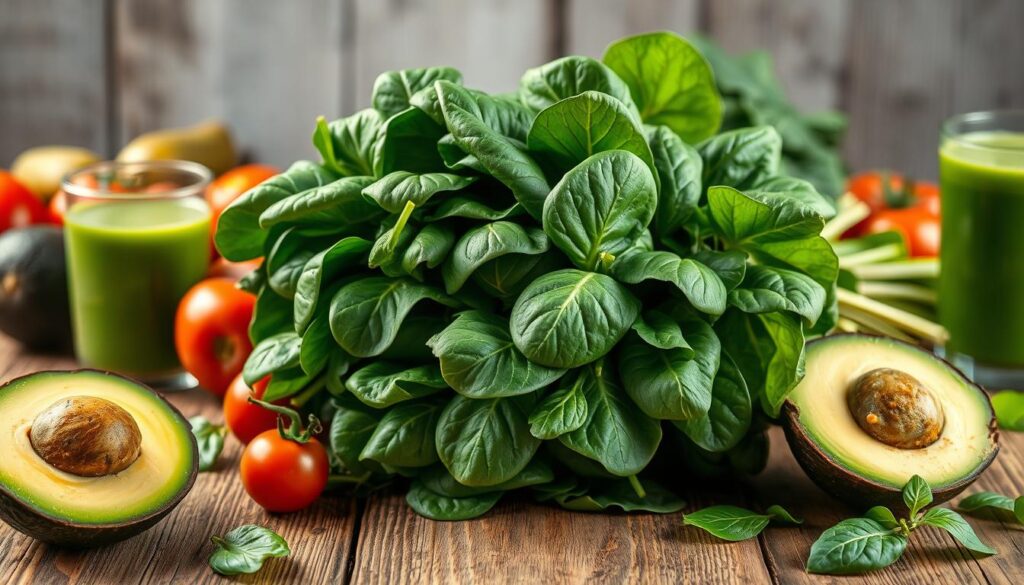Ever wondered why spinach is called a superfood? What makes it so special for our health? Let’s dive into the nutritional wonders of spinach leaves. You’ll find a wealth of vitamins and minerals that boost your health.
Spinach comes from Central Asia. It’s not just a green veggie. It’s a nutrient powerhouse with amazing health perks.
Spinach is great for your bones, immune system, and eyes. This article will show you why spinach is key for staying healthy.
Key Takeaways
- Spinach is rich in essential nutrients for good health.
- It boosts immune function and bone health with vitamin K.
- Spinach’s antioxidants may fight inflammation and lower cancer risk.
- It’s low in calories, perfect for managing weight.
- Eating spinach can improve eye health and brain function.
Introduction to Spinach
Spinach (Spinacia oleracea) is a leafy green veggie known for its nutritional value and health perks. It comes from Persia and is now grown in many places, like the U.S. and Northern Europe. You can find spinach in salads and cooked dishes.
Spinach is packed with vitamins, minerals, and antioxidants. It has a lot of potassium, with one cup cooked giving you 840 mg. This is almost a quarter of what you need daily. It also has a lot of vitamin A, with half a cup boiled spinach giving you 573 micrograms. This meets 64% of your daily needs.
Spinach is good for your health. It has vitamins A and C, which help prevent cancer. Just 100 grams of raw spinach has 23 calories and 2.2 grams of fiber. This helps your digestion and might stop constipation.
Spinach is great in many recipes, like salads, smoothies, and dips. It has a mild taste that doesn’t overpower other foods. Raw spinach stays fresh for a week in an airtight container with a dry towel.
Learning about spinach nutrition facts can help you eat better. Spinach is full of water and good phytochemicals. Eating more fruits and veggies, like spinach, can lower disease risks and improve health. Add spinach to your meals for its many health benefits.
What Nutrients Does Spinach Provide?

Spinach is packed with vitamins and minerals, making it a superfood. It’s famous for its vitamin K, with just one cup giving you 120 percent of the daily value. A three-cup serving boosts this to over 300 percent of the daily value.
Spinach also offers other key vitamins. A three-cup serving gives you over 160 percent of the daily value for vitamin A and over 40 percent for vitamin C. Plus, one cup of raw spinach has about 45 percent of the daily value for folate, important for DNA health.
Looking at iron vitamin K spinach nutrition facts, you’ll see it’s low in calories, with about 6.9 calories per cup. It has only 0.1 grams of fat. The fiber content, at 0.7 grams per cup, helps with digestion and keeps energy density low.
Raw spinach offers more than just basic vitamins. It’s very watery, with about 91 percent water content, making it refreshing and hydrating. It also has antioxidants like kaempferol and quercetin, which are good for your health.
| Nutrient | One Cup Serving | Three Cup Serving |
|---|---|---|
| Calories | 6.9 | 20.7 |
| Vitamin K (%) | 120% | 300% |
| Vitamin A (%) | 15% | 160% |
| Vitamin C (%) | 40% | Downside |
| Folate (%) | 45% | Downside |
| Fiber (g) | 0.7 | 2.1 |
Spinach is a powerhouse of nutrients for a balanced diet. Adding it to your meals can give you essential vitamins and minerals while enjoying its health perks.
Spinach Advantages: Nutritional Profile
Spinach is a superfood with a rich nutritional profile. It’s easy to add to your meals for big health gains. This leafy green is full of vitamins, minerals, and antioxidants.
Vitamins and Minerals in Spinach
Spinach is a powerhouse of vitamin K spinach content. One cup gives you over 100% of your daily vitamin K needs. It’s also packed with vitamins A and C, key for health.
Spinach is low in calories, with just 7 per cup. This makes it great for weight management. It’s also rich in iron, calcium, and magnesium, important for the body.
A cup of raw or half a cup of cooked spinach is easy to add to meals. Eating spinach regularly boosts your nutrient intake. It offers many health benefits of antioxidants and essential minerals.
Micronutrients and Antioxidants
Spinach is full of micronutrients that are good for you. It has folate and potassium, which help with blood pressure and heart health. It’s also rich in spinach antioxidants like lutein and zeaxanthin.
These antioxidants help fight oxidative stress and may lower disease risk. Eating spinach regularly can protect against cancer and improve heart health. Adding spinach to your diet is a smart move for better health.
Spinach Benefits for Bone Health

Spinach is a top choice among leafy greens for its spinach advantages for bones. It’s rich in spinach vitamin K content. Vitamin K helps your body absorb calcium, which is key for strong bones. This vitamin also lowers the risk of bone fractures, making it vital for bone health.
Spinach also has minerals like magnesium that boost bone density. Magnesium is important for bone structure and helps with nerve and muscle function. This is great for keeping your bones and body moving well.
So, why is spinach good for bones? It’s full of vitamins and minerals like calcium and iron. Calcium keeps bones and teeth strong, while iron helps make healthy red blood cells. Together, these nutrients make spinach a top choice for bone health.
| Nutrient | Function | Spinach Content (per cup) | Recommended Daily Intake (RDI) | % RDI |
|---|---|---|---|---|
| Vitamin K | Bone health, calcium absorption | 121% of RDI | 90 mcg | 121% |
| Calcium | Bone and teeth strength | 6% of RDI | 1,000 mg | 6% |
| Magnesium | Bone density, nerve function | 39 mg | 400 mg | 10% |
| Iron | Red blood cell production | 5% of RDI | 18 mg | 5% |
Eating spinach can give you these important nutrients for better bone health. It’s great in salads, smoothies, or cooked dishes. Spinach is a tasty way to help strengthen your bones.
How Spinach Supports Immune Function

Spinach is packed with nutrients like vitamins A, C, and E. These vitamins are key to a strong immune system and fighting off infections.
Vitamin C is a big player in boosting immunity. It helps make white blood cells, which fight off bad guys. Spinach gives you 47% of your daily vitamin C in just 100 grams.
Spinach also has vitamin A, giving you 108% of your daily needs in 100 grams. Vitamin A keeps your skin and mucous membranes healthy. This helps block harmful pathogens. Vitamin E adds to this protection, making spinach a powerful trio for your immune system.
Adding spinach to your meals is easy and tasty. Try it in smoothies, omelets, or lentil dishes. These ways not only taste great but also give you all the nutrients you need.
| Nutrient | Content per 100g | % Daily Value |
|---|---|---|
| Vitamin A | 469 μg | 108% |
| Vitamin C | 47 mg | 47% |
| Vitamin E | 2.03 mg | 14% |
| Potassium | 633 mg | 18% |
| Calcium | 126 mg | 10% |
| Iron | 2.7 mg | 15% |
Spinach and Eye Health

Spinach is a superfood for your eyes, thanks to its high levels of lutein and zeaxanthin. These compounds are key to protecting your vision. Eating spinach regularly can help prevent eye diseases that come with age.
Lutein and Zeaxanthin for Vision Protection
Lutein in spinach helps block harmful blue light. This is important for keeping retinal cells safe. Eating five servings of spinach a week can cut cataract risk by 50%.
Adding spinach to your meals is good for your eyes in the long run. Here’s why:
- Lutein and Zeaxanthin Benefits: These antioxidants boost visual clarity by increasing macular pigment density.
- Low Caloric Count: Spinach has only 7 calories per cup, making it a low-calorie choice.
- Biodiversity of Nutrients: It’s full of vitamins A, K, and C, which are good for your health.
| Spinach Nutrients | Daily Value Percentage | Function for Eye Health |
|---|---|---|
| Lutein | Optimal: 10mg | Protects against oxidative stress and filters blue light |
| Zeaxanthin | Optimal: 2mg | Supports retinal health and reduces cataract risks |
| Vitamin A | 56% of daily needs | Improves night vision and overall sight |
| Vitamin K | Completes daily needs | Essential for eye and bone health |
Eating spinach can help keep your eyes healthy and prevent vision problems as you get older.
Does Spinach Have Special Strength Promoting Properties?

Spinach is seen as a superfood for strength and athletic performance. It’s packed with nutrients like iron, which is key for muscle oxygen transport. This is vital for muscles to work well during exercise.
Spinach also has nitrates, which turn into nitric oxide in our bodies. This boosts blood flow and cuts down oxygen use during workouts. It helps with endurance and muscle recovery after exercise.
Eating spinach gives you important vitamins and minerals for muscle health. It’s rich in magnesium, potassium, and calcium, which help muscles contract and relax. Plus, it has fiber for better digestion and weight control, supporting fitness goals.
For athletes and fitness lovers, spinach is a great part of a healthy diet. Its vitamins, minerals, and phytonutrients improve metabolic health. Studies show eating more veggies, like spinach, can lower death rates, showing its health benefits.
In short, spinach isn’t a magic strength builder. But it has many health benefits that support muscle function and overall well-being. Adding spinach to your diet is a smart choice for a healthy lifestyle.
Benefits of Eating Spinach Raw vs. Cooked

Knowing the benefits spinach raw and nutritional benefits of cooked spinach helps in making better food choices. Both ways of eating spinach have their own health perks. A 100-gram serving of raw or cooked spinach has about the same nutrients, including calories, carbs, protein, fat, and fiber.
Raw spinach has 2.71 mg of iron per 100 grams. Cooking it increases the iron to 3.57 mg. Cooking also makes vitamins A and E, protein, fiber, zinc, thiamin, calcium, and iron more available. Raw spinach, on the other hand, keeps folate, vitamin C, niacin, riboflavin, and potassium, which are important for health.
How well your body absorbs iron depends on several factors. Raw spinach has oxalic acid, which can block iron and calcium absorption. Cooking spinach can reduce this acid, making more nutrients available.
Studies show that cooked spinach and carrots increase blood levels of beta-carotene. This compound helps lower heart disease and lung cancer risks. Cooking methods like sautéing or stir-frying keep more nutrients than boiling or overcooking.
Choosing between raw vs cooked spinach health benefits depends on your diet and taste. Mixing both into your meals ensures you get all the nutrients.
| Nutrient | Raw Spinach (100g) | Cooked Spinach (100g) |
|---|---|---|
| Calories | 23 | 23 |
| Carbohydrates | 3.8 g | 3.8 g |
| Protein | 3 g | 3 g |
| Fat | 0.3 g | 0.3 g |
| Fiber | 2.4 g | 2.4 g |
| Iron | 2.71 mg | 3.57 mg |
| Vitamin A | Lower | Higher |
| Vitamin E | Lower | Higher |
| Zinc | Lower | Higher |
| Folate | Higher | Lower |
| Vitamin C | Higher | Lower |
Spinach for Weight Loss and Digestive Health

Adding spinach to your meals can help with weight loss. It has just 7 calories per cup but is packed with nutrients. The fiber in spinach, about 1g per cup, helps you feel full and avoid unhealthy snacks.
Spinach is also very hydrating, with 91.4g of water per 100g. This makes your meals more nutritious and flavorful. It’s a great way to boost your health without adding extra calories.
Spinach is good for your digestive health too. It keeps your digestive system regular and prevents constipation. It’s also rich in vitamins C and K, magnesium, and potassium, which are good for your overall health. This makes spinach a great addition to salads, smoothies, and more.
Spinach Advantages: Nutritional Benefits

Spinach is packed with nutrients, making it a superfood. It has only 23 calories per 100g but is full of essential vitamins and minerals. Eating it regularly can improve your health and make your diet more balanced.
To get the most benefits, eat about 90g of spinach five times a week. This is like 3.5 tablespoons of cooked spinach. It’s rich in vitamins A, C, and E, which boost your immune system and help your eyes stay healthy.
Spinach also has iron, potassium, calcium, magnesium, and phosphorus. These minerals are key for blood pressure control and strong bones. Plus, it has antioxidants like lutein and zeaxanthin that fight off diseases.
Spinach is also good for your heart. Vitamin C and other compounds in it can lower the risk of heart disease. Potassium and nitrates in spinach also help lower blood pressure by relaxing blood vessels.
| Nutrient | Amount per 1 cup (30g) | % Daily Value |
|---|---|---|
| Calories | 27 | 1% |
| Iron | 0.813 mg | 4.52% |
| Magnesium | 23.7 mg | 5.64% |
| Potassium | 167 mg | 3.55% |
| Vitamin A | 2816 IU | 56% |
| Vitamin C | 28.1 mg | 31% |
Spinach is also great for your brain. It’s full of folate and beta-carotene, which support your brain and help control blood sugar. These benefits make spinach a superfood that’s good for you.
Potential Disadvantages of Eating Spinach

Spinach is packed with benefits, but it’s good to know about its downsides. One major issue is its high oxalate content. This can make it hard for your body to absorb minerals. People with kidney stones should be careful because too much oxalate can make their condition worse.
If you’re taking blood-thinning meds, eating spinach might not be a good idea. Spinach has vitamin K, which helps blood clot. This could mess with how well your meds work. It’s important to eat spinach in moderation if you’re on these meds.
Eating too much spinach can also upset your stomach. You might feel gassy, bloated, or have cramps. These side effects are important to think about when planning your meals.
Some people might be allergic to spinach because of histamine. Bad spinach can cause serious problems like low blood pressure, shaking, or throwing up. It’s key to make sure your spinach is safe and clean.
It’s important to weigh the good and bad of spinach in your diet. Here’s a quick rundown of the downsides:
| Potential Downsides | Description |
|---|---|
| High Oxalate Content | Can lead to kidney stone formation and interfere with mineral absorption. |
| Vitamin K Interaction | May interfere with blood-thinning medications’ effectiveness. |
| Digestive Issues | Excessive consumption can cause gas, bloating, and cramps. |
| Allergic Reactions | Histamine in spinach may trigger allergic responses in some individuals. |
| Contamination Risks | Potential health risks from contaminated spinach, including low blood pressure and nausea. |
Conclusion
Spinach is a superfood that’s packed with health benefits. It’s low in calories, with just 23 kcal per 100 grams. This makes it great for weight management. It also has calcium, magnesium, and iron, which are good for your body.
Spinach is also good for your bones, immune system, and eyes. It’s full of vitamins and antioxidants. This makes it a key part of a healthy diet.
Eating spinach can also lower your risk of diseases like cancer and heart disease. It’s a tasty way to boost your health. Enjoy it raw in salads or cooked in dishes.
Spinach is a must-have in a balanced diet. It’s not only delicious but also offers many health benefits. Add it to your meals and enjoy the taste and benefits it brings.

